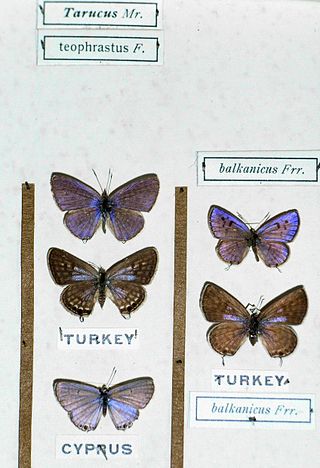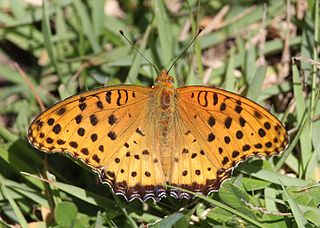
Athyma selenophora, the staff sergeant, is a species of nymphalid butterfly found in tropical and subtropical Asia.

Tarucus theophrastus, the common tiger blue, pointed Pierrot or African Pierrot, is a small butterfly found in the Old World tropics. It belongs to the lycaenids or blues family.

Azanus jesous, the African babul blue or topaz-spotted blue, is a small butterfly found in Africa, Egypt, Syria, India, Sri Lanka and Myanmar that belongs to the lycaenids or blues family.

Niphanda cymbia, the pointed Pierrot, is a small butterfly found in northern India, Burma and northern Borneo that belongs to the lycaenids or blues family.

Jamides bochus, the dark cerulean, is a small butterfly found in Indomalayan realm that belongs to the lycaenids or blues family. The species was first described by Caspar Stoll in 1782.

Jamides celeno, the common cerulean, is a small butterfly found in Indomalayan realm belonging to the lycaenids or blues family. The species was first described by Pieter Cramer in 1775.

Hypolimnas misippus, the Danaid eggfly, mimic, or diadem, is a widespread species of nymphalid butterfly. It is well known for polymorphism and mimicry. Males are blackish with distinctive white spots that are fringed in blue. Females are in multiple forms that include male-like forms while others closely resemble the toxic butterflies Danaus chrysippus and Danaus plexippus.

Curetis bulis, the bright sunbeam, is a species of butterfly belonging to the lycaenid family. It is found in Asia.

Prosotas noreia, the white-tipped lineblue, is a species of lycaenid butterfly found in South Asia and Java.

Cethosia nietneri, the Tamil lacewing, is a species of nymphalid butterfly found in Sri Lanka and south India. The species name is after John Nietner who obtained specimens of the butterfly from Ceylon from which it was described.

The Indian fritillary is a species of butterfly of the nymphalid or brush-footed family. It is usually found from south and southeast Asia to Australia.

Acrapex brunnea is a species of moth of the family Noctuidae first described by George Hampson in 1910. It is found in Africa, including Angola, Kenya and South Africa.
Dichomeris eurynotus is a moth in the family Gelechiidae. It was described by Walsingham in 1897. It is found in the Central African Republic and Sierra Leone.
Helcystogramma juventellus is a moth in the family Gelechiidae. It was described by Walsingham in 1897. It is found in Jamaica and Mexico (Tabasco).
Chionodes phalacra is a moth in the family Gelechiidae. It is found in North America, where it has been recorded from Texas, Arizona and Mexico. It has also been recorded from Cuba.
Commatica ophitis is a moth in the family Gelechiidae. It was described by Walsingham in 1911. It is found in Mexico (Tabasco), Guyana and Ecuador.
Battaristis symphora is a moth of the family Gelechiidae. It was described by Walsingham in 1911. It is found in Mexico (Tabasco).
Compsolechia titanota is a moth of the family Gelechiidae. It was described by Walsingham in 1910. It is found in Guatemala.
Aristotelia pyrodercia is a moth of the family Gelechiidae. It was described by Walsingham in 1910. It is found in Mexico (Guerrero).
Zetesima lasia is a moth in the family Depressariidae. It was described by Walsingham in 1912. It is found in Panama.










